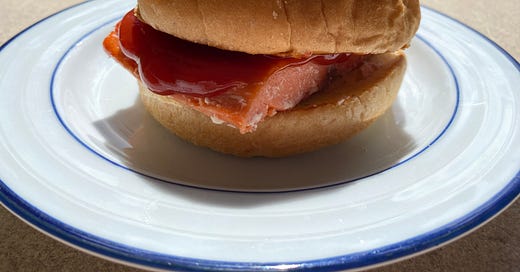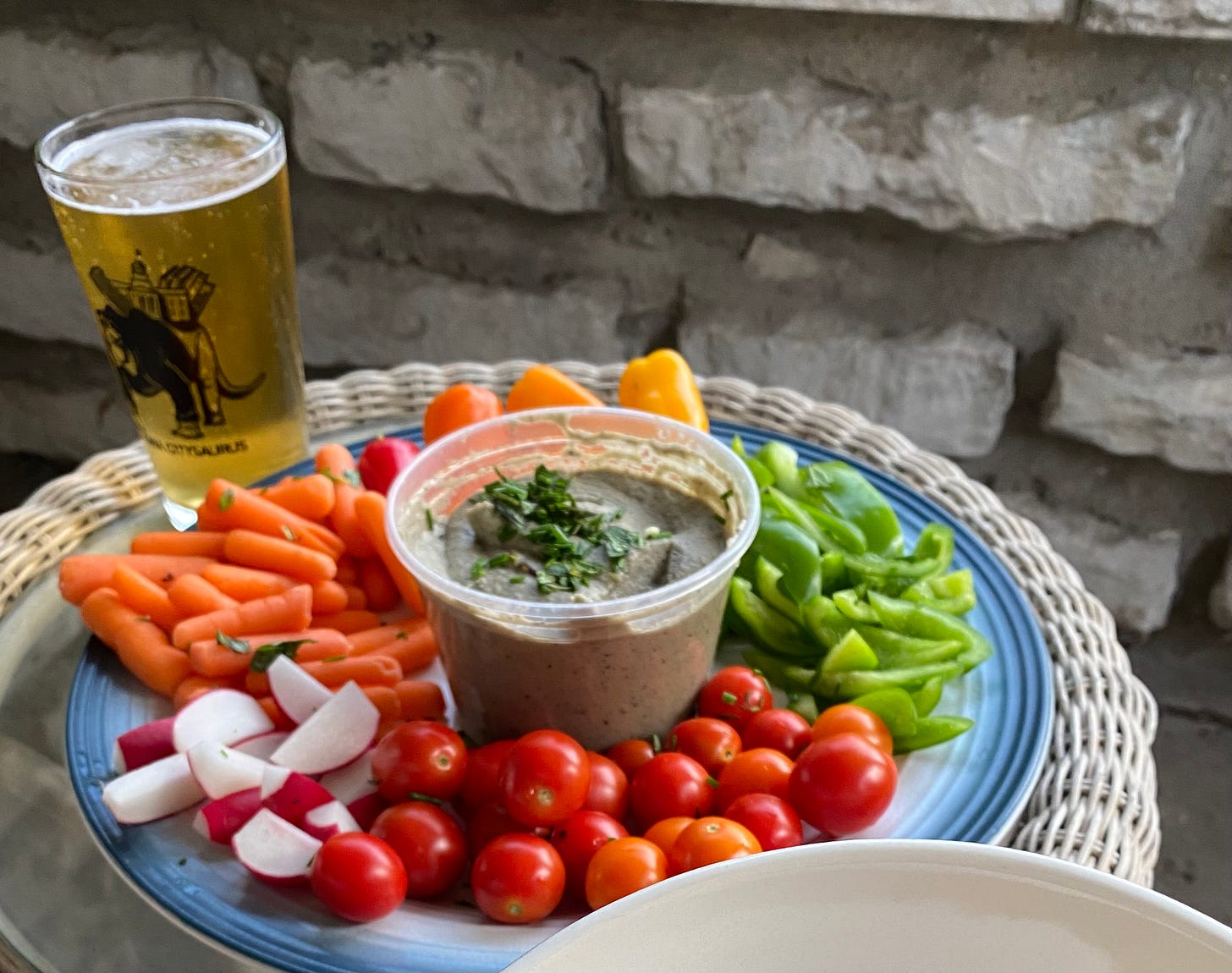I realize I’m out of tahini halfway into making baba ganoush. It’s too late—I’ve committed. I have already blackened the eggplant, already scraped its smoky entrails and glooped them into a bowl. I search my cupboard for a tahini alternative and find nothing but a deli container full of sesame seeds—black sesame seeds. Why not? I toast them in a pan, blend them into a sticky paste, and whisk a dollop of my homemade tahini into the eggplant.
The baba ganoush is gray. Not the appealing gray of a baby rabbit, but a lifeless gray. Nausea-gray. Zombie-skin gray. A gray that screams “inedible, and possibly lethal.”
I briefly consider eating it with a napkin over my head, like an ortolan bunting. Instead, I pronounce it “the nadir of baba ganoush” and eat it on my porch with a handful of carrot sticks, trying not to look down.
In some ways, I trade on people’s trust that I know good food and am capable of preparing it. But at least 30 percent of the time, I fuck up. I get distracted. I get impatient. I overcook the pasta, I undercook the beans. I serve them anyway, wincing all the while. “Never apologize,” Julia Child famously advised—but I am not Julia Child.
At the same time, I believe wholeheartedly that it’s okay to be a mediocre cook. I should know. I’ve been a mediocre Cook all my life.
I’ve been thinking about mediocre meals in part because of a piece I read in The Atlantic titled “What Mitt Romney Saw in the Senate.” I recommend it! It’s a good piece for a variety of reasons, not the least of which is its ability to make me feel real human empathy for a man named “Mitt.”
But it initially got my attention—and the attention of a lot of other Food People—for a section on Romney’s eating habits.
“On the day of my first visit, [Romney] showed me his freezer, which was full of salmon fillets that had been given to him by Lisa Murkowski, the senator from Alaska. He didn’t especially like salmon but found that if he put it on a hamburger bun and smothered it in ketchup, it made for a serviceable meal.”
As you can imagine, people reacted to this revelation in a very chill, measured way. Which is to say: people immediately began dunking on it, much in the way they dunked on Donald Trump for ordering a steak well-done.
I’m not interested in defending either man. But I am interested in food as a cultural sorting mechanism, and the ways in which we treat “bad” food as a metonym for vice. Eating salmon with ketchup wouldn’t be noteworthy if it didn’t come with a host of assumptions about the eater’s character—their taste, their curiosity, their perspective, their skill. Either you reverse-sear your steaks to a perfect 130° Fahrenheit, or you chomp down a tasteless brick of meat dust on your way to your job at the Suck Factory.
I decided to make the salmon.
Romney didn’t describe how he cooked his salmon fillets, but I had an idea. I searched my heart: was there anything I wasn’t willing to do in the service of culinary empathy? Yes, I concluded: microwaving fish in my own home.
I grabbed a bag of Alaskan salmon fillets from Costco and baked them using the Samin Nosrat method—about 20 minutes in a 225° F oven. The resulting salmon was tender and flaky but stippled with a pale white secretion called albumin. (Albumin, as we all know, is the part of the salmon made out of egg.) I scraped as much of it off as I could and turned my attention to the bun.
I spread a little mayonnaise on the bun and toasted it in a pan, which was probably cheating, but otherwise followed my assumed script: soft supermarket hamburger bun, blanket of cold ketchup.
I took a bite. It tasted…fine. Good, even. The mere act of splurting ketchup on fish made my taste buds hallucinate that it was cocktail sauce.
Would I do it again? Probably not. Was it an unforgivable culinary crime? Who would make the arrest?
Food writers (the thoughtful ones, at least) try to cover the ethics of eating—the conditions under which fieldworkers labor, the contributions of animal agriculture to climate change. But the bulk of our output is a lot more frivolous. In the end, most people just want to read about taste.
But there’s no obligation to create food that tastes good—at least, no moral obligation. Chefs will sometimes wax poetic about what we “owe” to good ingredients, but any debt we owe is ultimately to each other. The salmon doesn’t care how I dress it.
I forget that sometimes. I’m always min-maxing dinner, always chasing the ur-version of any dish. Regularly, I find myself Googling “the best mashed potatoes” or “the best fried okra” as if this were a reasonable goal. The best fried okra was never going to be cooked by a haggard Kansas City woman who had consumed nothing that day but a martini and a 16-ounce can of wasabi peas.
And that pursuit isn’t value-neutral. At its worst, our attempts to signal culinary sophistication can flatten American cuisine into a homogenous idea of a dish. We read a Serious Eats explainer or watch a season of “Good Eats” and decide that the only worthwhile fried chicken is buttermilk-brined and fried in shortening; we end up collapsing it into a genus when we could have had a many-splendored species.
I visited a restaurant in Oldenburg, Indiana recently that serves fried chicken seasoned only with salt and a prodigious amount of black pepper. It’s a style that might induce the more food-media-pilled among us to sneer: “where’s the seasoning?” But Indiana has its own storied fried chicken tradition—and it’s worth preserving even if it never makes it into Bon Appétit.
I’m conflating mediocrity with perceived mediocrity a bit, here. I happen to think Indiana’s lard-fried, pepper-spiked chicken is excellent. What I’m trying to get at is the cost of taking ourselves so seriously—of getting so caught up with improvement at the margins that we forget how to have a good time.
It’s okay to thaw a Costco salmon filet and slather it with ketchup. It’s okay to bake a chicken breast. It’s okay to spend all day cooking a beautiful, elegant, richly spiced meal. It’s okay to just have dinner.
If this newsletter has a consistent theme, it’s that food should be a source of joy. But the “should” in that sentence isn’t an imperative—it’s an ideal.
The joy comes first. And if it never comes, we may as well get dinner on the table without too much fuss.
Die-cut Haterade stickers are available!
They’re free and stylish and will instantly signal your bad taste to your peers! Details on how to claim one here.
If you liked this post, please share, subscribe, or send to a friend! Most new subscriptions come from people sharing a post that they enjoyed. And if you’d like to keep the Haterade flowing, you can donate to the Liz Cook Center for Conservative Condiments here: Venmo | PayPal







Thoughtful and thought-provoking, as always.
One thing missing from all the chatter about Romney and the salmon is that there's something virtuous about eating something you don't particularly like — something that was a gift from a colleague — rather than just chucking it or letting it stay in your freezer forever. Romney is a fabulously wealthy man who clearly has the resources to obtain whatever food he prefers, but instead he's found a way to make use of a gift that wouldn't normally be in his culinary wheelhouse. Good for him.
The best time to experiment with food is at 3 AM when you're hungry but don't want to cook anything serious. Sometimes ice cream is involved....